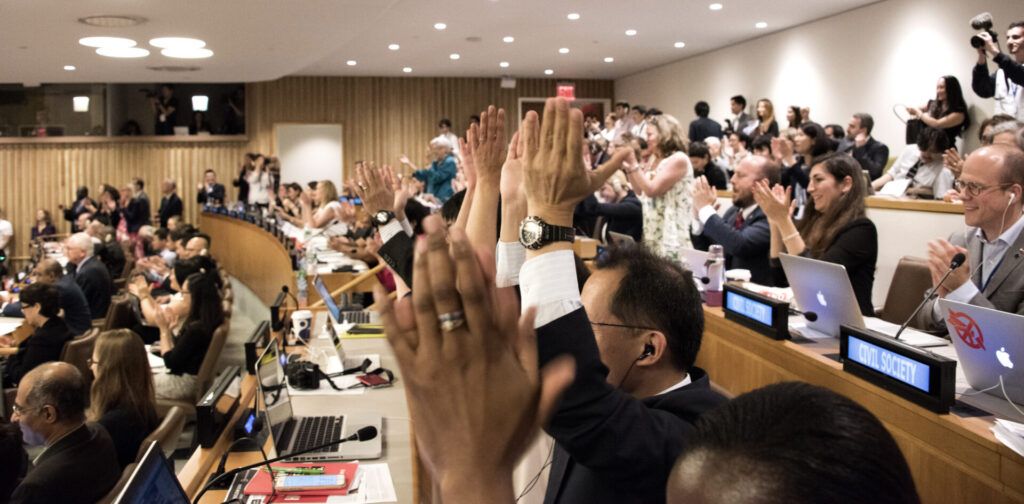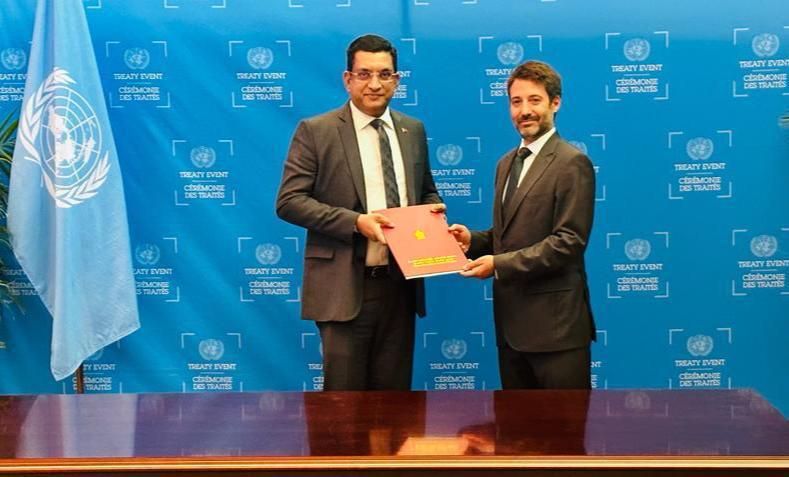Bridging the gap between nuclear ban treaty supporters and opponents
By Hideo Asano | November 20, 2023
 The moment of the nuclear ban treaty's adoption on July 27, 2017. Credit: ICAN/Clare Conboy
The moment of the nuclear ban treaty's adoption on July 27, 2017. Credit: ICAN/Clare Conboy
The first-ever meeting of states parties to the Treaty on the Prohibition of Nuclear Weapons took place in June 2022 in the midst of growing nuclear threats, most notably the Russian invasion of Ukraine. The meeting ended with the successful adoption of a political declaration and an ambitious action plan for abolishing nuclear weapons.
Since then, the nuclear landscape has become bleaker, with an escalating nuclear arms race and decaying arms control frameworks. Against this backdrop the ban treaty will host its second meeting later this month.
Despite the pressing need for international cooperation to address nuclear threats, the rift between supporters and opponents of the ban treaty remains deep. Opponents argue that it undermines the step-by-step nuclear disarmament process of the much older Nuclear Non-Proliferation Treaty (NPT) and fails to take into account international security concerns that have stalled disarmament efforts so far. Supporters, on the other hand, argue that the ban treaty complements Article VI of the NPT, which calls for good-faith negotiations “on effective measures relating to cessation of the nuclear arms race at an early date and to nuclear disarmament, and on a treaty on general and complete disarmament.”
While the discourse often frames the two treaties as contradictory approaches, a close examination of the ban treaty reveals three ways in which it complements and can further advance the step-by-step approach to nuclear disarmament preferred by the nuclear weapon states: promoting understanding of nuclear risks; strengthening the international norm against nuclear testing; and reinforcing the taboo against using nuclear weapons. Constructive cooperation between ban treaty supporters and opponents in these three areas could help address growing nuclear dangers and move nuclear disarmament forward. To this end, opponents should consider participating in the ban treaty’s second meeting as observers.

Understanding nuclear risks. The Treaty on the Prohibition of Nuclear Weapons is instrumental in promoting and deepening understanding of growing nuclear risks. While the humanitarian consequences of nuclear weapons are often highlighted as the treaty’s main focus, the declaration adopted at the first meeting also brought attention to “the risk of a nuclear weapon detonation by accident, miscalculation or design” and noted that “achieving and maintaining a nuclear-weapon-free world serves both national and collective security interests.” The treaty aims to promote the recognition of these nuclear risks. For example, a recently established Scientific Advisory Group examined thematic issues, including nuclear risks, and has finalized a report to be presented at this month’s meeting.
Nuclear risks were discussed in detail at the Vienna Conference on the Humanitarian Impact of Nuclear Weapons, held a day before the ban treaty’s first meeting in 2022. Along with new findings on the consequences of potential nuclear weapons use, the conference addressed issues such as nuclear near-misses, the destabilizing implications of new technologies, and the risks of nuclear use in Northeast Asia and Ukraine.
Addressing the risks of nuclear use is an urgent task in today’s security environment. Tensions between the United States and Russia have heightened in recent years, while US-Russia bilateral arms control frameworks have significantly eroded. The US-China relationship has also rapidly worsened. In this political climate, the ban treaty helps rally stronger global support for reducing nuclear risks, which over the long term may encourage nuclear-armed states to engage in nuclear risk reduction and arms control measures—a critical step in nuclear disarmament and abolition efforts.
Nuclear testing. The ban treaty is also an effective framework for reinforcing the international norm against explosive nuclear testing, which has been under strain in recent years. The Trump administration reportedly considered the resumption of nuclear tests in 2020, following its accusations that Russia and perhaps China had conducted low-yield nuclear tests. In February, Russian President Vladimir Putin announced that Russia was ready to resume nuclear tests if the United States did so, although the idea was later dismissed by Moscow. Putin has also revoked Russia’s ratification of the Comprehensive Nuclear Test Ban Treaty. The United States, Russia, and China all continue activities at their former test sites and maintain at least some degree of readiness for possible future nuclear testing.
In light of these concerns, opposition to explosive nuclear testing has regained traction in recent years. Many experts urged Trump not to resume testing, on both scientific and political grounds. At the Hiroshima Summit in May, the G7 leaders criticized Putin’s February statement and stressed the international norm against explosive nuclear testing, urging renewed efforts to the nuclear test ban treaty bring into force. Now, many have expressed their concern about Russia’s withdrawal from the test ban treaty.
A call for a nuclear test ban is consistent with the disarmament processes of both the Non-Proliferation Treaty and the ban treaty. At the last NPT Review Conference, the draft final document, although not adopted, reaffirmed that NPT state parties will pursue the urgent entry into force of the test ban treaty and, in the meantime, commit to a nuclear testing moratorium.
The Treaty on the Prohibition of Nuclear Weapons also supports the test ban treaty and opposes nuclear testing. Ban treaty advocates have brought into nuclear disarmament discussions the diverse voices of nuclear survivors, including not only A-bomb survivors from Hiroshima and Nagasaki but also individuals from communities affected by nuclear testing, such as those from the Pacific Islands and Kazakhstan, who have borne life-long sufferings due to past nuclear tests.
Ban treaty advocates and opponents can find a shared interest in strengthening the international norm against explosive nuclear testing. Although the nuclear weapon states may not fully endorse the treaty’s claims about the humanitarian consequences of past nuclear tests, mutual support for the nuclear testing moratorium could help narrow the gap between ban treaty proponents and opponents. Some solidarity has already been achieved under the test ban treaty, which has been signed and ratified by most countries, but the disarmament process of the Treaty on the Prohibition of Nuclear Weapons can be used to further reinforce the norm against explosive nuclear testing and increase momentum for additional test ban treaty ratifications and entry into force.
Reinforcing the nuclear taboo. Even if the Treaty on the Prohibition of Nuclear Weapons has the potential to facilitate efforts in furthering nuclear risk reduction and opposing nuclear testing, states that rely on nuclear weapon for their security may still argue that the ban treaty ignores the international security context.
It is true that the immediate signing of the ban treaty by these states would come at the expense of the nuclear deterrence their security depends on. It is also the understandable reality that the five nuclear weapon states “do not accept any claim that it [the ban treaty] contributes to the development of customary international law,” because stigmatization of nuclear weapons to that extent could undermine their nuclear deterrent.
At the same time, the ban treaty has made an indispensable contribution to preventing nuclear wars. According to Nina Tannenwald, a political scientist at Brown University, the ban treaty plays a significant role as an “institution” to reinforce the nuclear taboo—the moral inhibition against the first use of nuclear weapons. The treaty’s state parties and civil-society supporters have consistently augmented the taboo, in particular by raising awareness of the humanitarian consequences of nuclear weapons use.
Upholding the nuclear taboo and the non-use of nuclear weapons has become increasingly important given recent nuclear discourse and policy developments. These include, to name a few, Trump’s loose talk about nuclear weapons, the deployment of low-yield nuclear weapons, North Korea’s new nuclear doctrine and nuclear intimidation, and Russia’s nuclear saber-rattling in the war in Ukraine.
In this political and security landscape, it seems necessary to reinforce the nuclear taboo and the international pressure for nuclear non-use. To this end, the nuclear weapon states and nuclear allies can support ban-treaty efforts to bring greater attention to the humanitarian consequences of nuclear weapons by, for example, endorsing humanitarian statements and sponsoring relevant conferences or educational programs to ensure that nuclear weapons are never used again in warfare.
Constructive cooperation. To capitalize in a meaningful way on these three areas of potential cooperation, advocates of the Treaty on the Prohibition of Nuclear Weapons need to avoid becoming too siloed. While criticizing nuclear deterrence to highlight its inherent risks and dangers is certainly necessary to pressure nuclear-armed states and allies to move forward with nuclear disarmament, ban treaty proponents should not simply dismiss practical cooperation as a distraction from the ban treaty’s core approach or as a justification for the nuclear status quo.
Instead, they should be open to seeking cooperation where complementarity exists. It would be significant for the upcoming ban treaty meeting to consider creating frameworks that allow officials and civil-society members from nuclear-armed states and allies to participate in relevant intersessional work.
Although not technically part of the framework of the Treaty on the Prohibition of Nuclear Weapons, future conferences on the humanitarian impact of nuclear weapons would be a great opportunity to raise awareness of growing nuclear risks, the dangers of resuming explosive nuclear testing, and the humanitarian consequences of nuclear weapons. A meeting host, typically a ban treaty state, could consult with nuclear-armed states and allies in advance to work out a meeting format that enables their attendance, as the Vienna 2014 Conference was attended by some nuclear weapons states. Nuclear weapon states and allies should consider sending their government officials (or experts in an unofficial capacity) to these conferences, while encouraging others to follow suit.
More important, the nuclear weapon states and allies should tone down their adamant opposition to almost all aspects of the ban treaty. Their current attitude is counterproductive and has fueled further dissatisfaction among the treaty’s advocates. Some experts have argued that withdrawal from the NPT is legitimate given the failure of the nuclear weapon states to implement their nuclear disarmament commitments. Although this would not be a wise course of action and is not supported by ban treaty state parties, such calls are an indicator of deep frustration with the progress of nuclear disarmament. Nuclear weapon states and allies should take cooperation with ban treaty states parties seriously and consider how to engage constructively with the ban treaty.
One good starting point would be to participate in the upcoming ban treaty meeting. Observers can deliver a statement about what they support and do not, as some US allies did at the first meeting of state parties last year. Building on this initial step, ban treaty opponents and proponents should explore possible areas of further cooperation that could take place in future meetings or intersessional work.
Together, we make the world safer.
The Bulletin elevates expert voices above the noise. But as an independent nonprofit organization, our operations depend on the support of readers like you. Help us continue to deliver quality journalism that holds leaders accountable. Your support of our work at any level is important. In return, we promise our coverage will be understandable, influential, vigilant, solution-oriented, and fair-minded. Together we can make a difference.
Keywords: NPT, TPNW, ban treaty
Topics: Nuclear Weapons, Opinion, Uncategorized, Voices of Tomorrow














